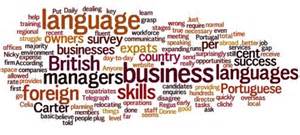 |
Facts
Duration: 1 -2 semester
Credits: 6 ECTS
Contact Hours: 64
Self-study: 124
Hours: 216
|
Main Objectives
Course objectives include enhancing an optimal functioning of a Master student in professional sphere, developing competences (general, linguistic, pragmatic) which are required in using the English language as a medium in international research cooperation, and also raising the level of student’s autonomy and capacity to self-education.
Learning Outcomes
A students should know:
- Strategies of presenting student’s research in English (paper at a research conference, seminar);
- Structure and style of professional documents (grant application, letter of reference, statement of purpose ect.)
- Basic types of dictionaries, programs of machine translation and translation memory;
- The basics of argumentative rhetoric;
- Methods and techniques of professional communication in English;
- Behavioural norms in communicative acts and styles of communication in English;
- principles of creating scientific texts in English;
- peculiarities of intercultural business communication and technics of leading successful business communication at presentations of international research projects and other forms of professional activities;
- peculiarities of monologic and dialogic speech;
- general rules of organising discussions;
- ways of perceiving complex text by ear;
- strategies of writing summaries an annotations in English;
A students should be able to:
- organize professional oral and written communication in English;
- translate and interpret texts in Humanities
- use freely the oral and written skills in English;
- create logically and linguistically correct oral and written texts in English with sufficient argumentation;
- to design results of оформлять результаты исследований в виде научных докладов и статей на родном и research in English;
- to maintain international correspondence;
- to meet requirements to design and contents of research texts;
- to translate scientific, business and publicistic texts at a high professional level;
- participate in a professional discussion/polemics/dialogue, express various communicative intentions;
Students should acquire skills in:
- practical usage of the system of functional styles of English;
- practical usage of written English to hold international correspondence;
- summarising and annotating English scientific texts;
- argumentative rhetoric in communicative acts in English.
Professor
Tikhomirova Yulia Alexandrovna, PhD in Philology, Associate Professor of the Department of Romance and Germanic Philology, Faculty of Philology
Course annotation
|
Course unit code |
М2.Б.2 |
|||||||||||||||||||||||||||
|
Course unit title |
Business Foreign Language (English) |
|||||||||||||||||||||||||||
|
Name(s), surname(s) and title of lecturer(s) |
Tikhomirova Yulia Alexandrovna, PhD in Philology, Associate Professor of the Department of Romance and Germanic Philology, Faculty of Philology |
|||||||||||||||||||||||||||
|
Level of course |
Master |
|||||||||||||||||||||||||||
|
Semester |
1-2 |
|||||||||||||||||||||||||||
|
ECTS credits |
6 |
|||||||||||||||||||||||||||
|
Working hours |
Contact hours |
64 |
||||||||||||||||||||||||||
|
Self-study |
124 |
|||||||||||||||||||||||||||
|
Total |
216 |
|||||||||||||||||||||||||||
|
Work of placement |
N/A |
|||||||||||||||||||||||||||
|
Prerequisites |
The entry level of English for this course should be sufficient to study a specialised program of English as a means of scientific communication (B1-B2). |
|||||||||||||||||||||||||||
|
Language of instruction |
English |
|||||||||||||||||||||||||||
|
Objectives of the course |
Learning outcomes |
A student’s assessments methods |
||||||||||||||||||||||||||
|
Course objectives include enhancing an optimal functioning of a Master student in professional sphere, developing competences (general, linguistic, pragmatic) which are required in using the English language as a medium in international research cooperation, and also raising the level of student’s autonomy and capacity to self-education. |
A students should know:
A students should be able to:
Students should acquire skills in:
|
Credit tests and assessed participation in a final course project |
||||||||||||||||||||||||||
|
Teaching methods |
Educational techniques used:
|
|||||||||||||||||||||||||||
|
Course unit content |
Course objectives are:
Gained knowledge and skills |
|||||||||||||||||||||||||||
|
List of Topics |
Topic title |
Contact hours |
Assignments and independent study hours |
|||||||||||||||||||||||||
|
1. Analytical reading, translation and interpretation of scientific texts in professional sphere |
20 |
40 |
||||||||||||||||||||||||||
|
2. Analytical writing in English |
20 |
40 |
||||||||||||||||||||||||||
|
3. Oral presentations of research results in English |
20 |
20 |
||||||||||||||||||||||||||
|
2. Writing a grant proposal in English |
4 |
24 |
||||||||||||||||||||||||||
|
Assessment requirements |
Assessed participation in the final project “Students’ Scientific Conference”. |
|||||||||||||||||||||||||||
|
Assessment criteria |
|
|||||||||||||||||||||||||||
|
The composition of final accumulative mark |
Student’s portfolio, attendance and participation in classroom activities, final project participation. |
|||||||||||||||||||||||||||
|
Author of the course |
Tikhomirova Yulia Alexandrovna, PhD in Philology, Associate Professor of the Department of Romance and Germanic Philology, Faculty of Philology |
|||||||||||||||||||||||||||
.png)